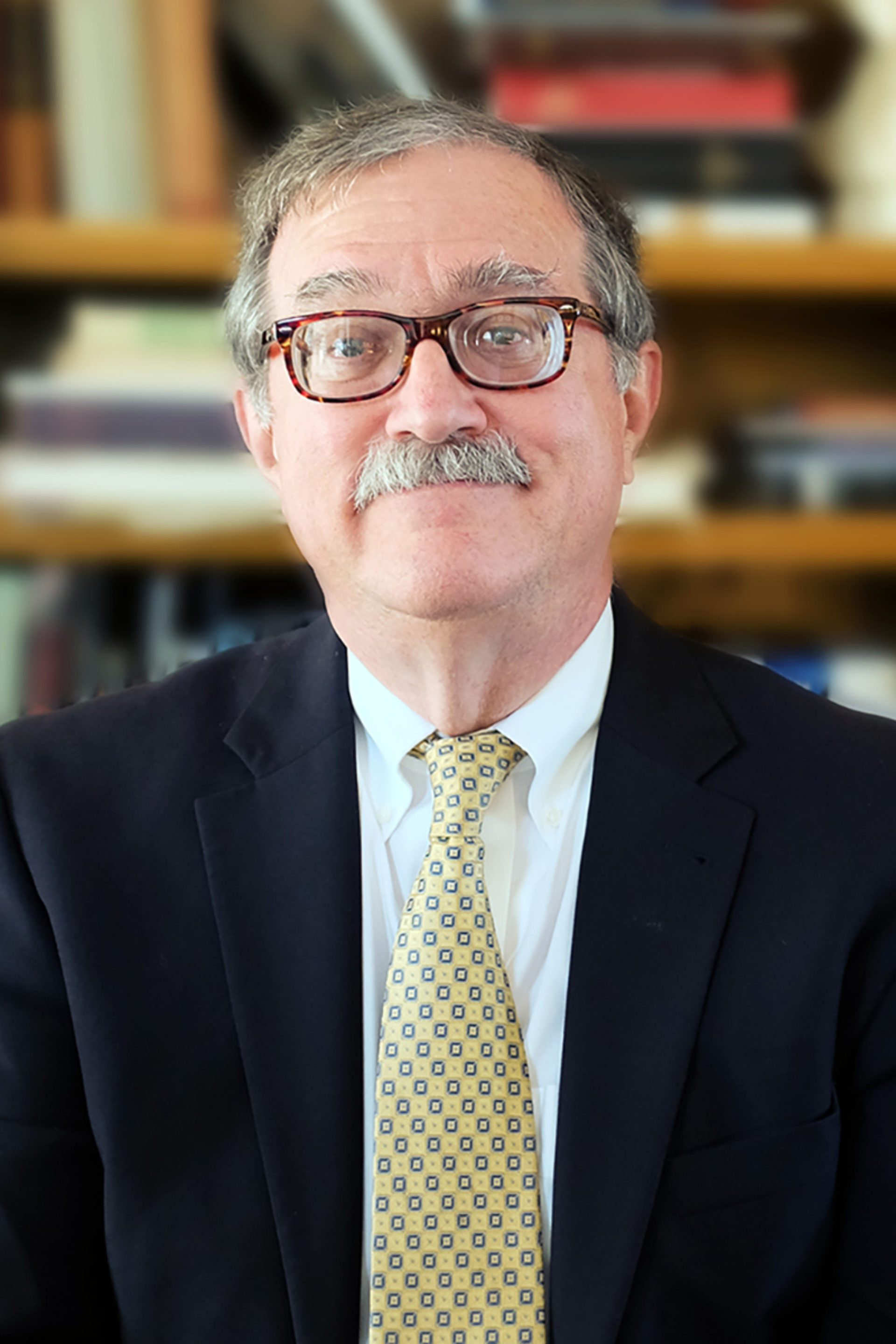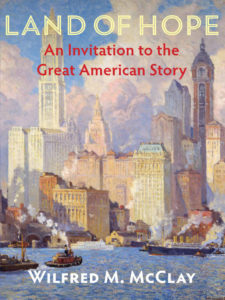

Dr. Wilfred McClay is the G. T. and Libby Blankenship Chair in the History of Liberty at the University of Oklahoma, and the Director of the Center for the History of Liberty. He is also an advisory scholar to the Faith and Liberty Discovery Center. An expert in American Intellectual history, Dr. McClay is the author of many books, most recently, Land of Hope: An Invitation to the Great American Story. American Discovery recently interviewed Dr. McClay about his new book and his involvement with the Discovery Center.
AD: In the Jewish and Christian traditions hope is considered a theological virtue. The Faith and Liberty Discovery Center has an entire gallery dedicated to the theme of “The Reality of Hope.” Your most recent book, Land of Hope: An Invitation to the Great American Story, appropriates the word hope in its title. Why have you selected this particular virtue for the title?
McClay: Because I think it is impossible to give an accurate account of America without giving a central place to the aspirational element in our makeup. That can take a material form, as in the striving to rise in the world and better one’s socioeconomic condition, or a spiritual one, as was the preeminent aspiration of the New England Puritans, and the other religious seekers who came to American shores seeking religious liberty and the freedom to worship God and build His church in the ways that they saw fit. But the bottom line is that you can add up every other measurable element in the makeup of American life, and you will still not be describing America if you omit the pervasive (but unmeasurable) influence of hope. Think about it: We Americans simply do not believe that anyone should be consigned to live their lives within the limits prescribed by their birth. That’s an unremarkable statement, in a sense; who would dispute it? We are so used to thinking in this way. But when you stand back and think about it, consider it as a characteristic of an entire people, and consider it over the span of human history, it is more than just remarkable. It’s astounding.
We Americans operate on the assumption that we are creatures with free wills and great aims, not merely tumbleweeds at the mercy of large historical forces. Hope is a quality of soul, something that may manifest itself in material pursuits, but that’s not quantifiable or explicable in strictly material terms. Let me say it again, it is a consistent characteristic of this country that its people have generally sought to rise above or move beyond the conditions of their birth—something not true of every people. To be an American is to believe that what we’re born into is never the final word about us. We have a spirit of striving, a lifting wind of hope, that goes back to our very beginnings, and seems as strong as ever.
AD: There are a lot of histories of America, and you’ve chosen to write yet another – one with a particular commitment to history as story. Why? For whom is this book written and how does it differ from other histories?
McClay: It’s written with young people in mind, juniors and seniors in high school and underclass college and university students. It differs in being, as you say, written in a genuinely narrative style, without sidebars, jazzy graphics, pull quotes, lavish photographs, or any of the rest of the paraphernalia that publishers seem to think young people need. I do it this way for two main reasons. First, I think all of us, and not merely the young, think about the past in terms of narratives, and not only analytic categories or measurable quantities. Of course, there are many themes that can’t be adequately treated in that way, and I understand that. The book does not aim to be the last word on American history; it hopes instead to be the first word, an invitation to the subject, one that will help launch a lifetime of interest.
I should mention too that I thought of this as a kind of “citizen’s history” of the United States, an account of what one needs to know about the American past in order to be a good citizen with a strong sense of membership in the American enterprise. There too I think the existing textbooks are wanting. They are always nervous about the concept of patriotism, which I think is a healthy and necessary element in our civic consciousness, and something that has to be taught, rather than being intuited or effortlessly breathed in with the air. There is a price to be paid for neglecting it. If you don’t find a way to teach the right kind of patriotism, what you will get in the end is the wrong kind of patriotism, something visceral, unreflective, and ungenerous.
So my target audience was the young. But all that said, I’ve been gratified at the large and enthusiastic readership that the book has attracted among adult general readers, who have never been exposed to this kind of writing. I get letters almost every day from people I don’t know, who feel the need to write and thank me for the book. I can’t tell you how good that makes me feel. It certainly was not anything that I expected.
AD: You’ve elected to emphasize the political history of the United States with a view toward citizenship education. In so many histories of America, the religious narratives are left out or treated in a compartmentalized way, so as to lose much of their moral, intellectual, and socio-political significance. How does your book incorporate the faith dimension in the political story of the America? In your telling of the “Great American Story” is there consideration of the relationship of faith and liberty?
McClay: I treat religion as a central phenomenon in all phases of American history, but especially in the Great Awakenings, the Founding period and in the great movements for reform in the 19th century, particularly the antislavery movement, as well as the Civil Rights Movement of the post-WWII period. Readers of Land of Hope will be in no doubt of the pervasiveness of religion’s influence in all these areas. But they also will be aware of the complexity of that influence. I make sure that readers do not fail to understand that the movement to abolish slavery was largely religious in character—and that there was an equal but opposite use of Biblical language and precedents to justify the existence of slavery. When Abraham Lincoln said of the Civil War, in his Second Inaugural, that “Both [sides] read the same Bible and pray to the same God, and each invokes His aid against the other,” he knew whereof he spoke. And yet what that fact showed was that a devotion to the Bible was a point of consistency, second nature to both sides; the disagreement was not between religion and irreligion.
AD: The book is beautifully produced. Its dust-jacket features artist Colin Campbell Cooper’s early 20th century impressionistic painting of New York Harbor, called Hudson River Waterfront. There is a wonderful selection of color plates as well as black and white historical images and maps. You’ve obviously worked very hard with the publisher to produce not only an integrated story with compelling content, but something of physical beauty. Could you tell us a little about the why and the what that went in to making this book so visually attractive?

McClay: Thank you for this compliment! The publisher, Encounter Books, deserves most of the credit for that; and even the part for which I can claim some credit—the selection of the Colin Campbell Cooper painting was mine—stemmed from their unusual generosity in allowing me to pick my own cover art. But even in that, I had a lot of assistance from the Encounter staffers, who probably don’t want me to name them, but they’re listed in the Acknowledgments for all the world to see! And the key to the book’s attractiveness, I believe, was the exquisite craftsmanship of its designer, Carl Scarborough, who is an artist in a class by himself. I feel very fortunate to have had the honor of working with him.
That said, I think we all felt that it was important to think of this as a book that would be worth keeping. In other words, we still believe in the idea of books as venerable physical objects, the best of which you keep in your family library and pass along from generation to generation. This idea is so old-fashioned that it’s radical. As you may know, the big textbook publishers are all moving toward digital forms of publication, which means we may soon see no more books as such in the classroom. Instead, it will not be long before students will be required to use—and institutions will be required to offer—the constantly updated digital texts, tethering students and schools exclusively to the publisher’s digital platform.
The gains of such a change are real, but vastly outweighed by the losses. In the early years of printing, printers would often display a truncated version of a Latin proverb: Littera scripta manet, which means, “The written letter remains.” The whole proverb reads: Vox audita perit littera scripta manet, which can be translated, “The heard voice perishes, but the written letter remains.” The proverb contrasts the fleetingness of orality with the permanence of literacy. What does such a proverb mean today, when our civilization—in which the great majority of inhabitants, as Christians and Jews, have been People of the Book—is fast becoming a civilization inhabited by People of the Screen, people tied to the ever-changing, ever-fluid, ever-malleable presentation of the past made possible by the nature of digital technology? This is a profound question, and we do not yet know the answer to it.
Which is precisely why we wanted to strike a blow, in our modest way, for permanence and beauty, for the kind of attractive book that people will want to hang on to. I’m immensely gratified that so many people seem to appreciate it. And again, I’m grateful to Encounter Books for its gutsy decision to publish the book that way.
AD: You argue that America is both a creed and a culture, a combination of universal ideals like the unalienable rights of “life, liberty, and the pursuit of happiness” as well as the particular sentiments of memory, history, tradition, culture, and land and that as humans and as citizens we need to remember and teach others to remember the meaning of places like Philadelphia and its Independence Hall. How might your book inform our work at the Faith and Liberty Discovery Center and the visitors who will shortly come through our doors?
McClay: I love what you have been doing so far. I think it is important to insist on the Bible’s centrality in our culture, how much it weaves in and through all of our most fundamental conceptions and, frankly, through what is best in us and about us. This is true whether one is a believer or not. It’s simply a matter of telling the truth about things. That’s what I strive to do in Land of Hope, not to proselytize or advocate; and indeed, one of the things that I treasure most about the reviews that the book has received has been their consistent stress upon its fairmindedness and evenhandedness. What I am not neutral about, though, is a deep and abiding affection for this country, as a place where the human soul has been given the liberty, as in no place else on earth, to discover God for itself. In America faith and liberty, and discovery, all go together, in a way that they never did before. That it all seems so natural to us now, that we now take it all so much for granted, is one of the ironic ways that we have been victims of our success.
AD: What animates your personal involvement as an affiliated scholar with the Faith and Liberty Discovery Center?
McClay: I’ve felt for a long time that religion in general, and Christianity in general, have been falsely consigned to a second-class status in American historical writing, a tendency that has been creeping into American law and American life more generally. I think it is important to have vibrant institutions like the Faith and Liberty Discovery Center to push back against these tendencies—not militantly or politically, but by way of gentle but insistent reminders of where we came from. I want to do whatever I can to help.
AD: What value do you think the Discovery Center brings to Philadelphia and the nation?
McClay: I think it can and should be a major attraction for tourists, school groups, and others who come to Philadelphia. Its very existence in the same city as Independence Hall is so important, as a way of asserting, not only in words but in venerable institutional stone, the coequal role of our nation’s religious heritage in helping to create, and helping to sustain, our constitutional form of government. America’s heritage is both religious and secular; it would not be the same without both being present. The Discovery Center’s presence in Philadelphia speaks eloquently to our nation’s providentially mixed heritage.